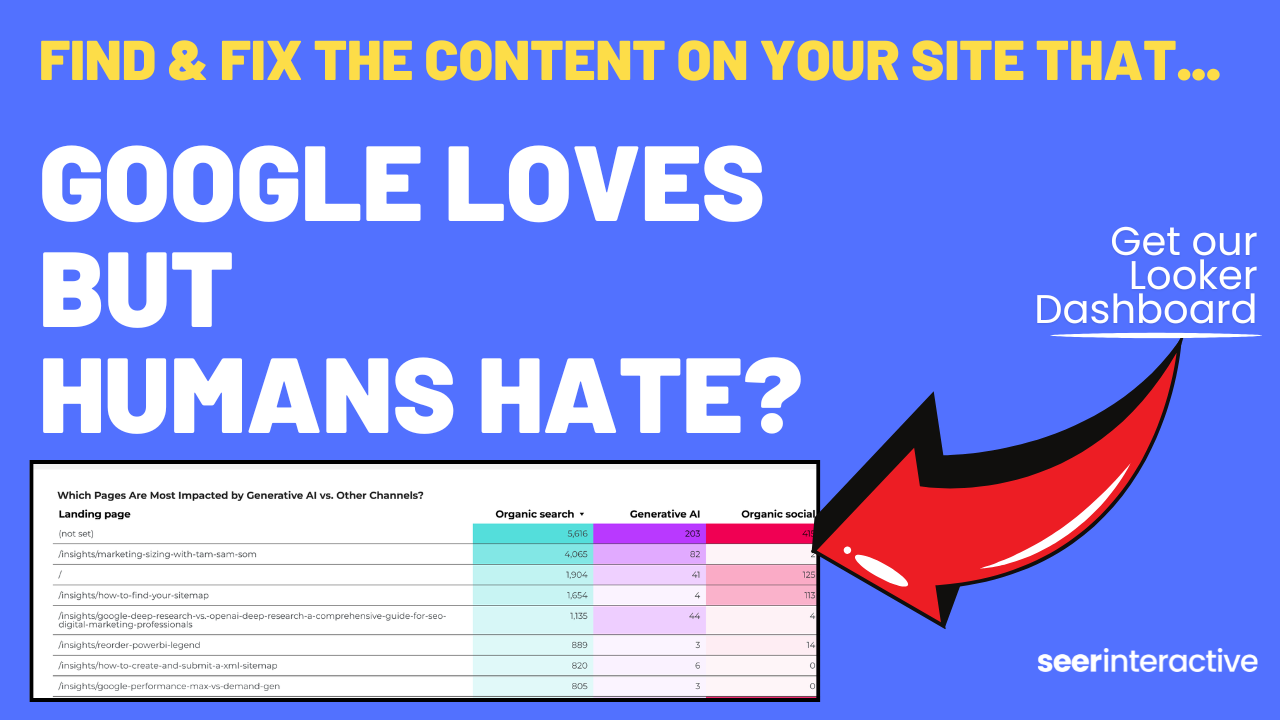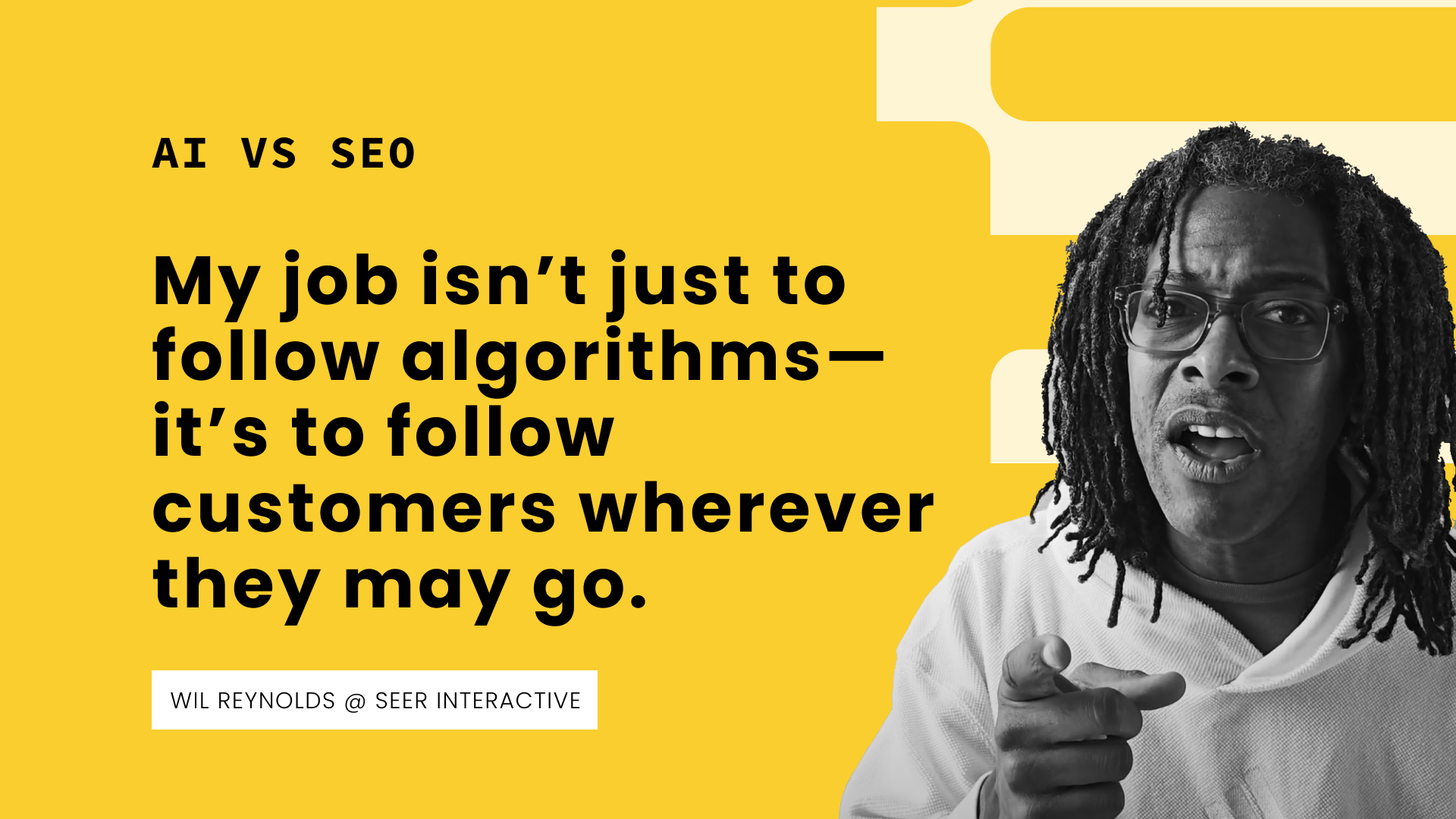Put on the AI ain't takin' my job playlist for motivation
So we’ve all heard the quote about AI and marketing from Sam Altman, CEO at OpenAI.
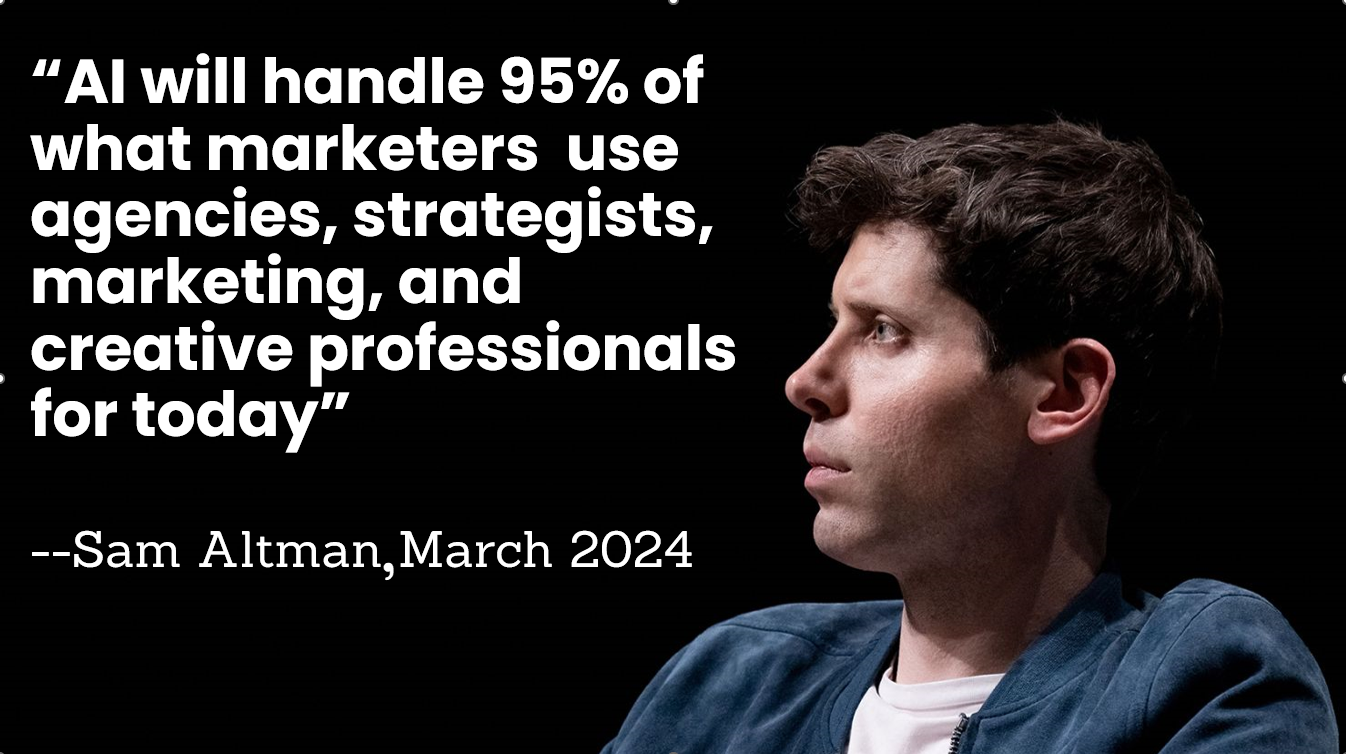
95% of what we as digital marketers do will be "handled" by AI, the word wasn't aided, it wasn't assisted, it was handled. That is a big statement.
I love extremes, extremes changes force me to think much broader than incremental changes do. Like I did here in my, what would you do tomorrow if search engines went extinct post.
So let's assume Sam is right, 95% of our work is done for us, but lets also assume that we must go through this in phases, for instance 10% today 35% in 3 years 50% in 6 years, etc...to eventually get to that 95%.
It is a progression, so how do you shape your career path to be standing at the end?
What is in your "I'm in the last 5%" survival kit?
That question got me thinking after Mike Kaput dropped that thought provoking piece in the most recent Marketing AI Podcast (I linked to the part here).
Imagine we're talking about a natural disaster, like a typhoon coming for us. We have weeks of notice to get ready, a warning so to speak. Consider Sam Altman's quote as our early warning signal.
Now assume we can't leave the place we're in, we're going to get hit. We intend to survive through this typhoon. We would need water, water purifiers, non perishable food, fire starters, first aid kits, flashlights, and flares, and of course we need our phones, laptops, and chargers cause we need social media. :)
If AI is going to take 95% of our jobs and we have to stay in this industry. We need to not only figure out how to survive, but what paths do we need to take after 10%, 35%, 50% of our jobs are automated?
Once 10% of your job is automated, do you have a roadmap on what to do with that 10% to keep you from getting hit by the next 35% wave coming in some distant future?
To build your survival kit, you must first and foremost assess your situation, the assessment is how you figure out the path. Is the work you are doing, and your work effort today in stage 1 (10% automation) or stage 5 (95% automation)?
You need a different AI job path survival kit for each stage.
We don't know how far apart those waves are but according to Sam, they are coming. And sorry to tell you, Sam has a better finger on the pulse than your co-worker claiming "but the hallucinations".
Get your surfboard, in the words of Cypress Hill, we ain't going out like that. Let's lay out the career path that will help you stay ahead of the laggards and eventually get you to leadership.
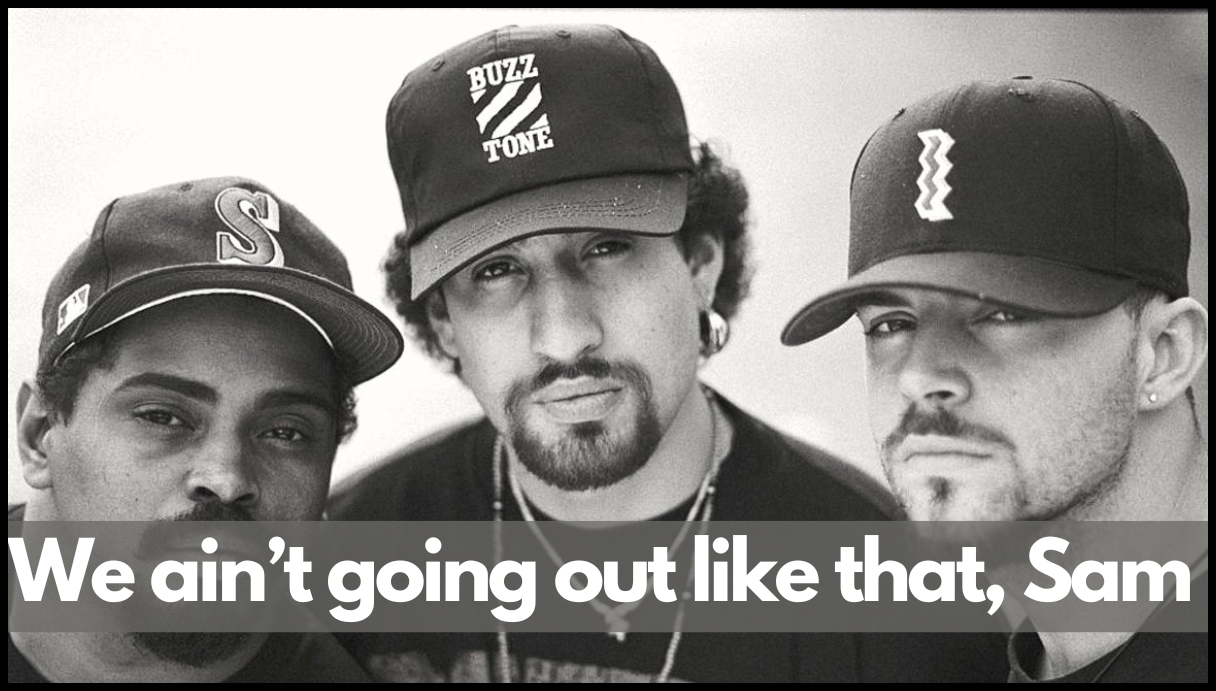
The purpose of this post is to help you self assess, plan, and execute, with some sights and sounds.
This is a survival situation though, when is the last time you were in one, time to level up!
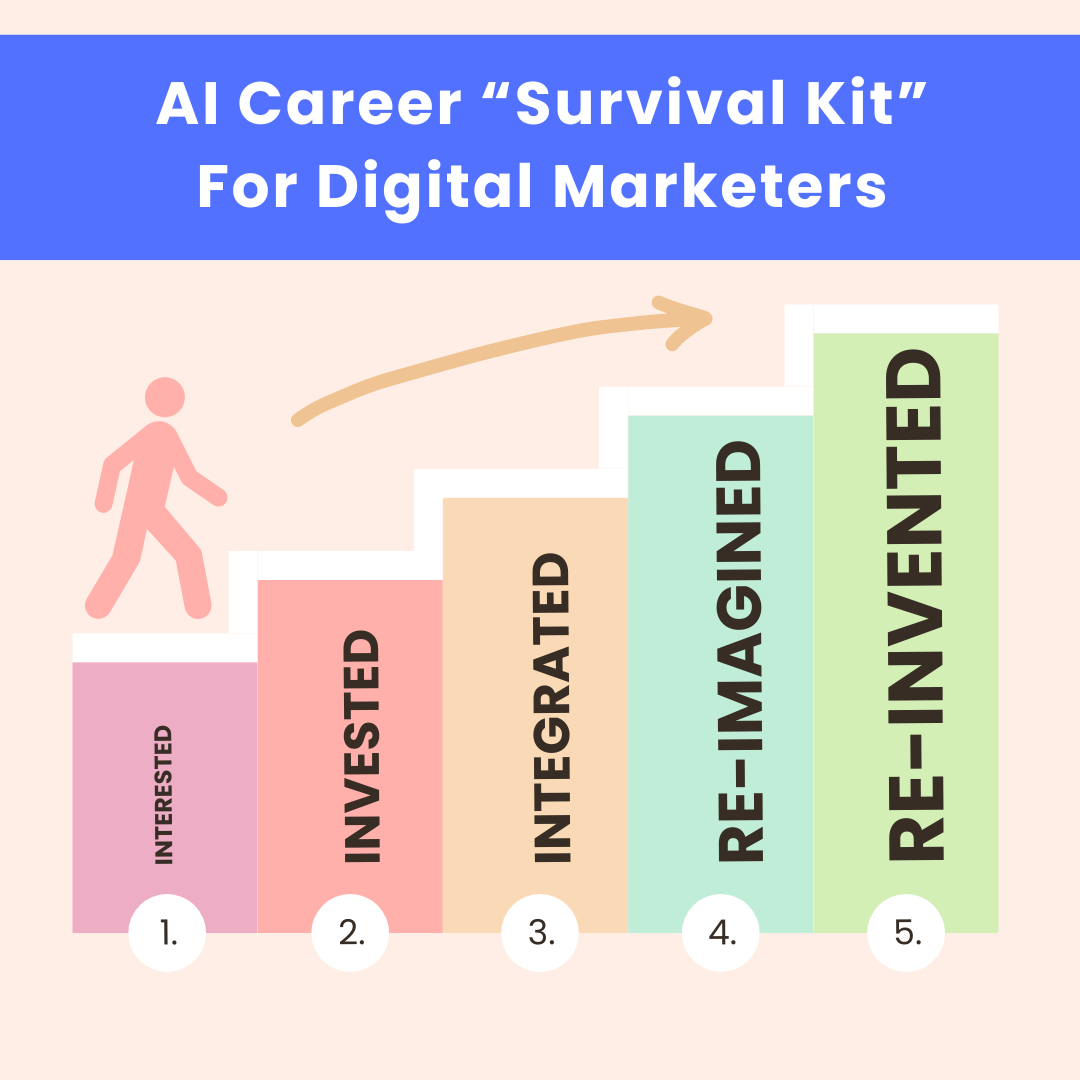
Stage 1 - Interested (Kinda)
In a Sam Altman world of 95% of our jobs being gone, marketers in this cohort are the first to be let go in any organization. You don't need to be here, it's easy to get out, there are a ton of free resources to get you to stage 2 in no time, so lets go.
Assessment of my work today
How much of my job is a checklist? Likely greater than 75%. Checklists aren't a bad thing, think about it pilots (who have autopilots to fly the plane) have checklists for a reason. Just because a plane can fly itself doesn't mean humans are going to be OK with a pilotless, or 1 pilot plane. Pre-AI your career path was to "cut your teeth" on basics, now the basics are being automated, leaving less opportunity.
Don't worry recent grads! The beauty is that you have been using this technology more than the people who graduated 1-3 years before you. You might be able to eclipse them in the fight for carving a career path relevant in an AI world.

AI Tool Adoption & Usage
Using AI: "If someone else pays I'll use it, but I'll pay for 5 streaming services to catch my favorite show".
The risk of this way of thinking is these people haven't been preparing for the typhoon at all. Paying 20 dollars per month for ChatGPT 4 isn't in the cards. Yet their entire 60-70-100k salary is dependent upon getting out of stage 1. If you are highly paid and in stage 1, lower paid people using AI are trying to replicate your experience with a chatbot.
If your company doesn't make funds available to pay for at least 1 tool then pay for it yourself, so you can keep up with how generative AI is progressing. I bet if you show value you'll get the budget.
People in stage 1 will use of AI tools provided to them, like a meeting notes tool will likely be used to get notes / next steps, but rarely will stage 1'ers push that tool to capabilities beyond the basic.
People who stay in this stage wouldn't take a transcript's AI driven "next steps" from the default tool (Otter, Fireflies or Zoom) and run it in ChatGPT 3.5, ChatGPT 4, Claude 3 Opus, Claude 3 Sonnet to see which others come up with different answers. This is a miss because this is how you learn their capabilities.
Someone in this stage likely doesn't have the apps on their mobile phone, which means they are missing out on some of the mobile features specifically, install 3-4 apps test different answers next time instead of doom scrolling.
Move TikTok & Instagram to a new place on your screen and replace them with any of these Apps.
While you are at it use a chrome plugin to redirect google.com to perplexity.ai.
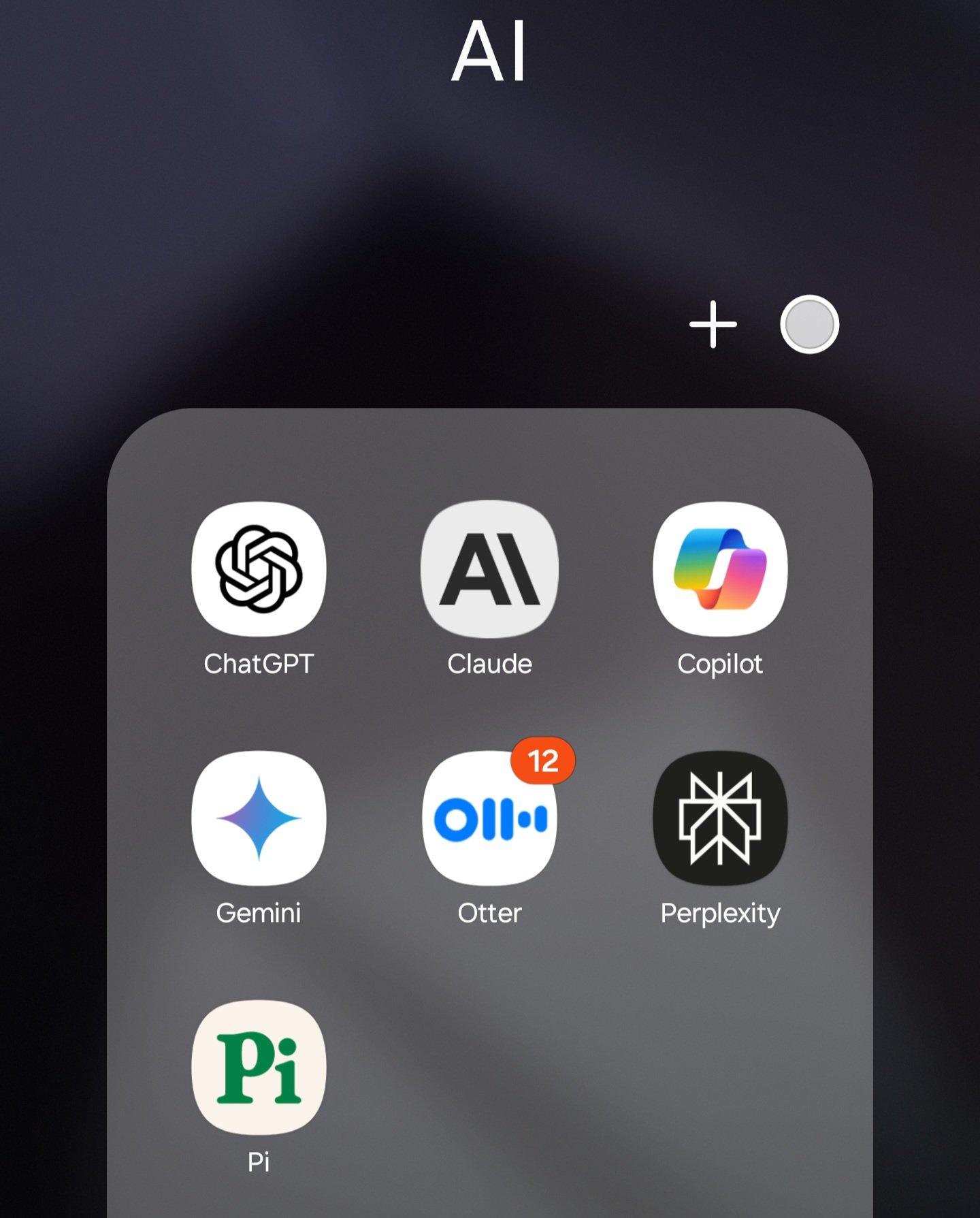
Mindset & Attitude Towards AI
Mindset, skeptic: People here often talk about what AI gets wrong today, but they lack the ongoing testing to know when it gets better. Hallucinations and ethical concerns are extremely valid reasons to be skeptical - but lean in, test, run the questions often so you know when they get better. That creates the value to get you to stage 2.
Learning & Skill Development
Getting out of their Pre-AI bubble: "I don't have time to follow up on the chats going on, or joining groups talking about AI". This is like someone saying a typhoon is coming, and the waves are getting higher and higher and them saying, I don't have time to move my arms and swim, I'm too busy working on my tan.
Some of the best thought starters to push your career forward in AI are free.
Look at this AI for B2B Marketers Summit, free.
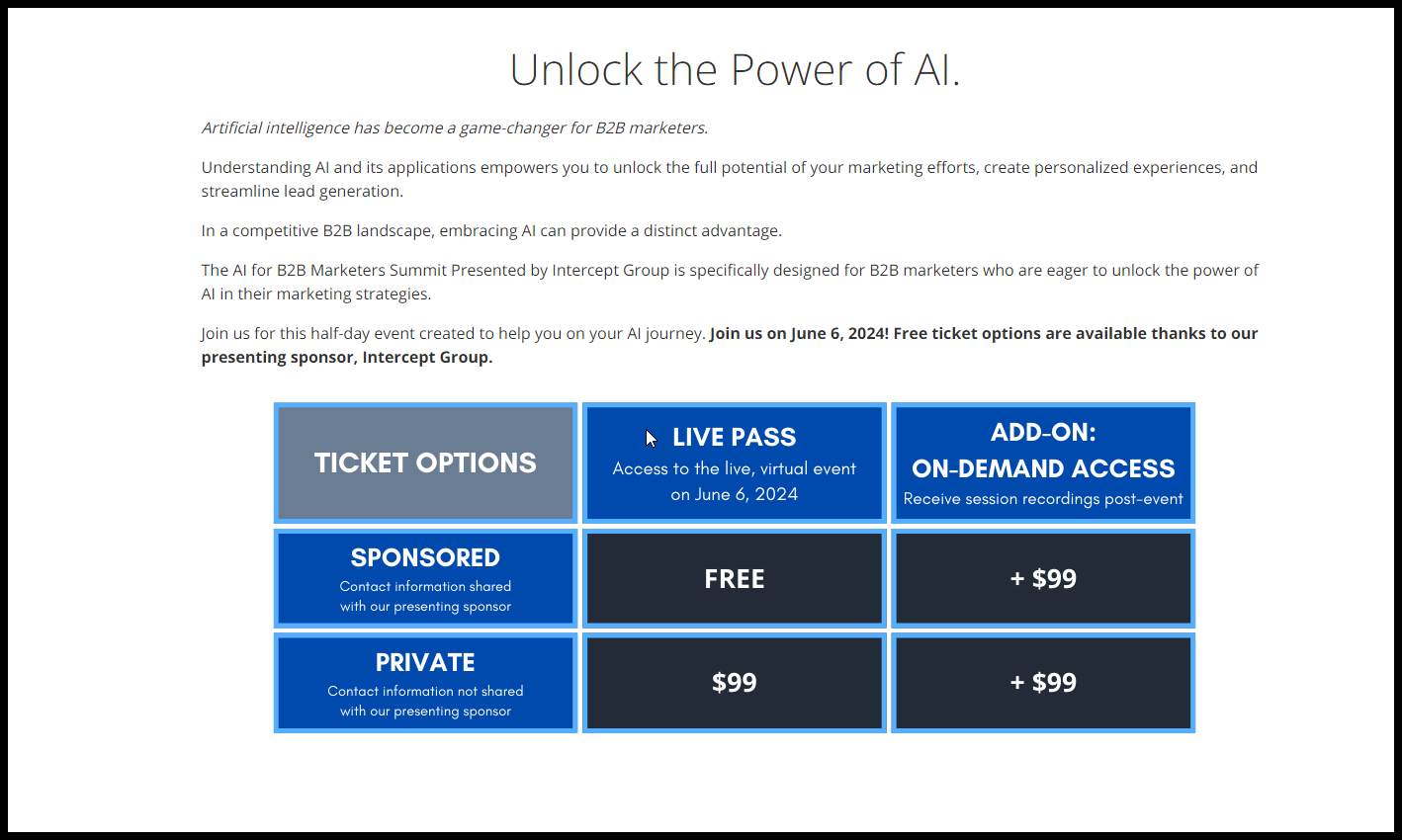
Thinking about AI and it's future disruptions in marketing, requires you to get out of your own head. You have to make time, the company may give you time, but you have to make time regardless.
You also need partners who go deep. Maybe every month you swap going deep on 1 webinar. Imagine if you are in a group of 5 accountability partners - everyone takes 1 webinar per month and summarizes TF out of it so everyone else doesn't have to.
Innovation and Application
Manual vs Scaled: Someone in this cohort chooses to spend time on traditional tasks instead of leveraging AI for efficiency.
They may Google "How to write an excel formula", then read 4 posts on it and watch 2 YouTube videos vs going to ChatGPT which may tell you, don't write the formula at all, there are better ways!
Last time I asked for a set of spreadsheet formulas, ChatGPT said...you know instead of inputting 4 different formulas you know we can make an apps script for you, would you like it?
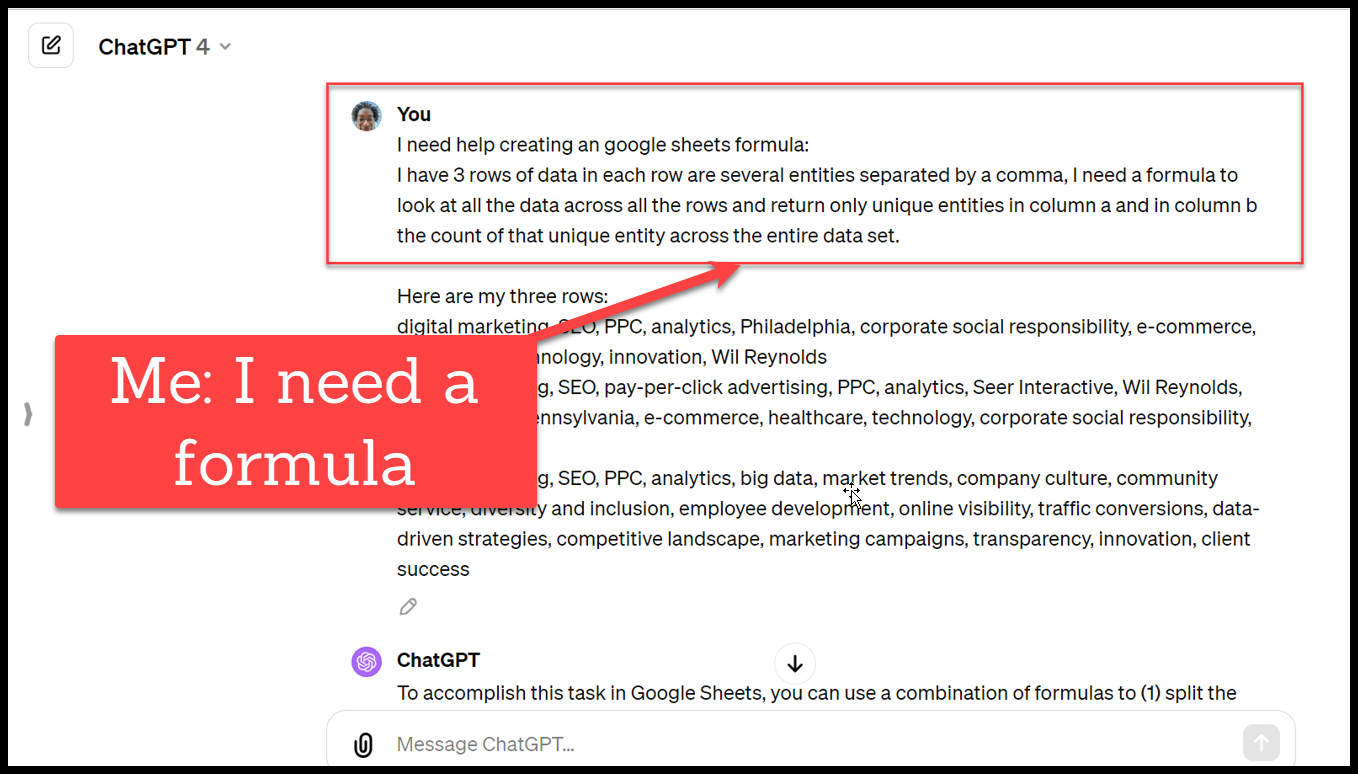
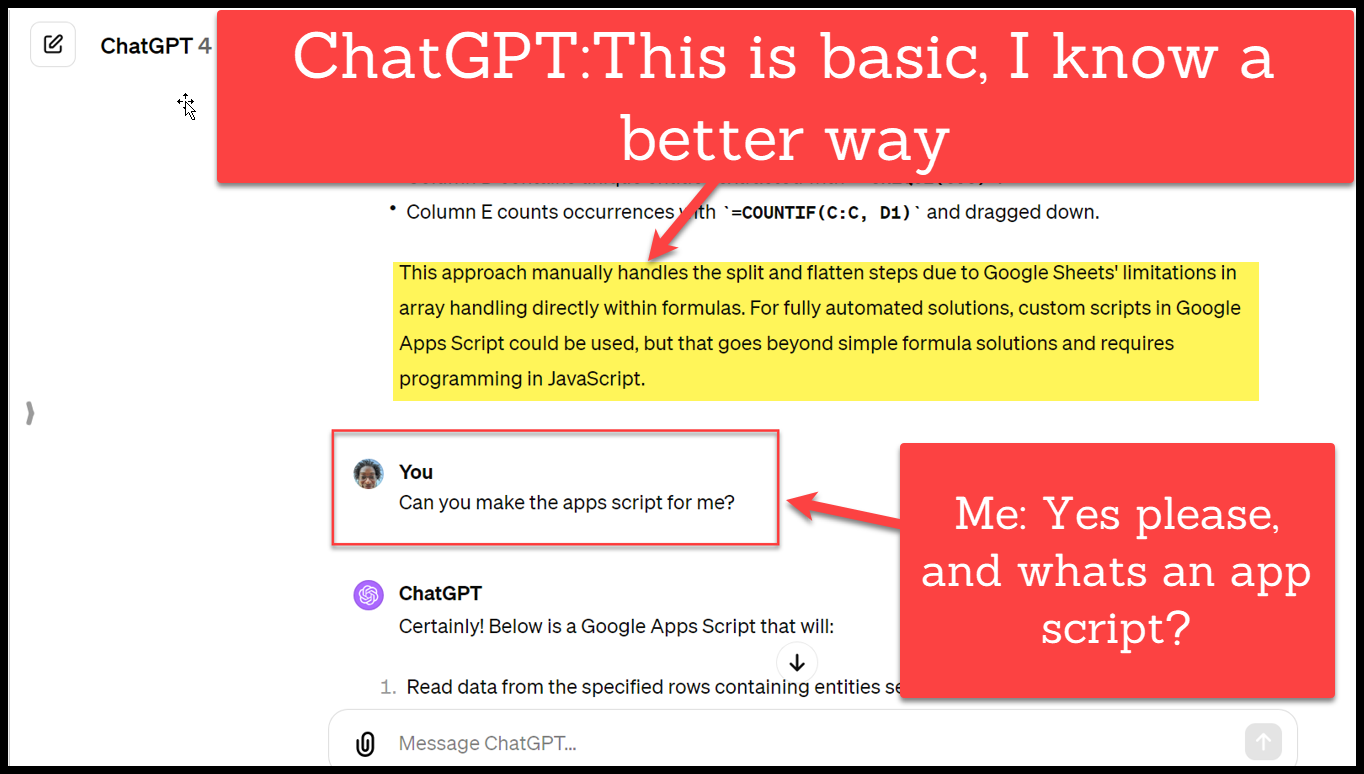
Higher scalability in my branded search analysis, now I can optimize for branded search in these AI search engines. All I had to do was copy and paste (after watching a video on how to install an apps script). Now I am rocking and rolling on my analysis.
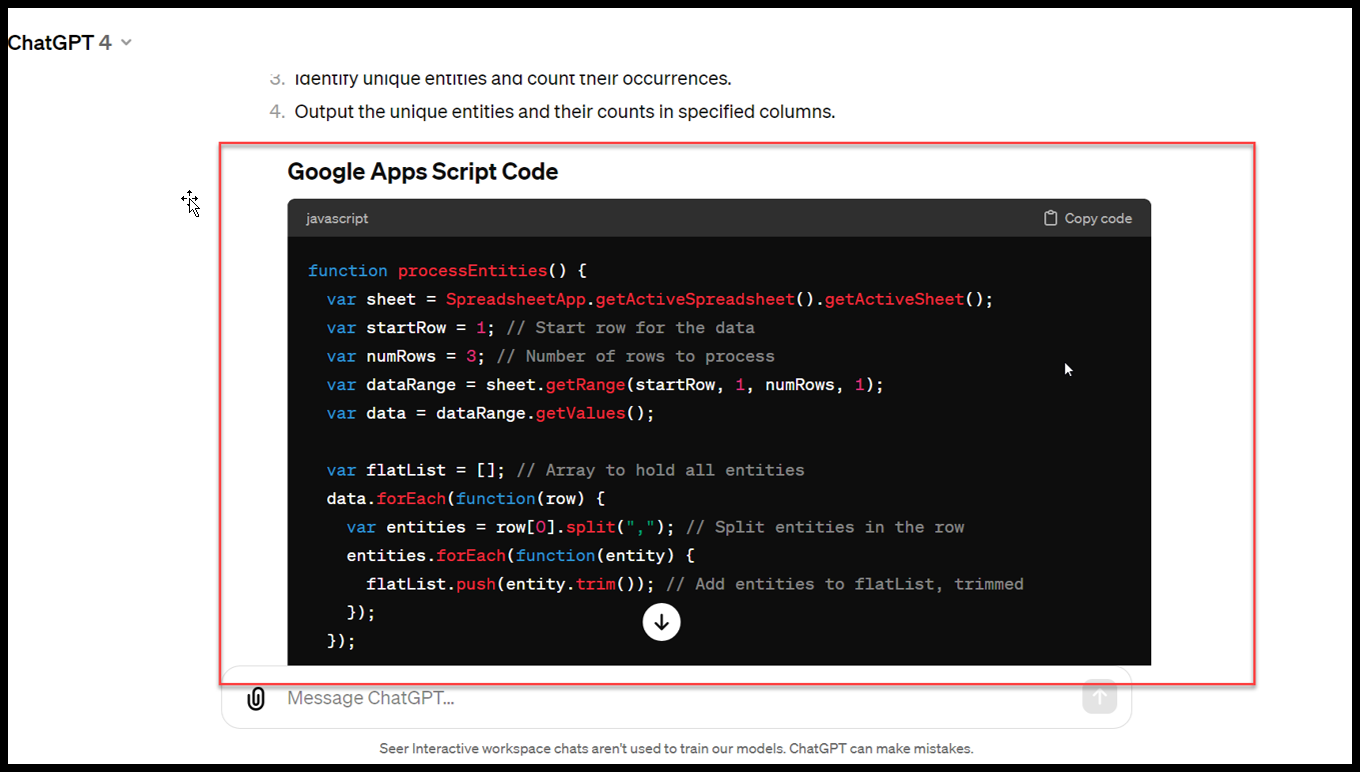
Documentation: Likely doesn't record calls, or processes, which means as the AI finally gets better they will start to record calls and processes when others who are "up the stages" have been doing it for years, giving them a bigger library of intelligence and processes to automate.
Delve into LazyGPT: If they use AI at all, it's likely to be copying and pasting outputs nearly verbatim, without adapting the content for tone or context.
When they do use AI, Stage 1 marketers in their AI journey are likely to leave behind trails of copy and paste, just look at their words, are they using words like "delve"? Their email marketing paragraphs, their SEO content pages, even their ads, just lack creativity and instead regress to the "autocorrect, predicted" next likely word.
Collaboration and Evangelism
AI Updates, low knowledge: Stage 1 folks usually can't distinguish between different versions of AI technologies (e.g., ChatGPT 3.5 vs. 4.0). "But the cut off dates!!" Might be the kind of reason they use to not engage.
The reason why this is dangerous is the less you use and interact with the tech, the further it advances faster leaving you further behind.
The less you use it, the less you help shape how your company sees it's value, risks, and opportunities.
Wil's Take
Staying in this stage means you are the first one to be downsized if Sam Altman is right, I think we could see Level 1 teams of 8 shrinking to teams of 2 in 6-18 months, 75% of these jobs may be gone. I dunno where this leaves your career.
Beware: Agencies hiring for full teams in these roles are likely behind the times, meaning the market might move on to agencies with AI solutions, resulting in risk even if you do retain your job.
Stage 2 - Invested
Assessment of my work today
How much of my job is a checklist? Likely 50/50. This means that you are getting put in positions to pivot from the typical process because you are processing client needs and tailoring what is in the checklist with what you hear and with your own experience and experiments.
This is the exploration and skill-building stage, once AI has wiped out the basic work, that work is gone, done.
The person who automates 50% of the checklist is usually more valuable than the person who does the checklist, you are in stage 2, lets get crackin'.
AI Tool Adoption & Usage
AI Tool Usage: Starts using basic AI tools to assist in marketing tasks, people here lean heavily on "in product" AI this person might say.
"I use the AI features Meta, Salesforce, or HubSpot gives me to solve a problem" or "I use OtterBot for meeting notes and I use the chat feature to ask it questions".
Someone in this stage may have an AI app installed but doesn't test extensively across models.
The ideas in this post were all fleshed out while on a 7 mile run, while my kid played laser tag at a birthday party and I needed something to do.
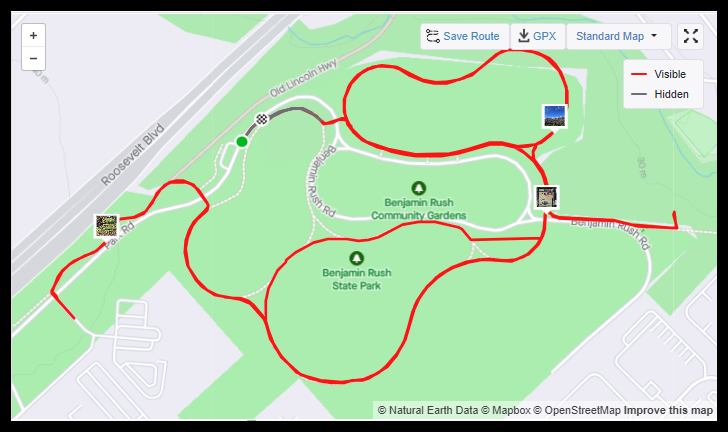
I used ChatGPT 4 and Claude 3 Opus to help me flesh out my ideas, challenge them, etc. When I'm playing pokemon with my kids, I ask ChatGPT what I can and can't do. It must be on your mobile to take advantage.
Stage 2 marketers dip their toes into the AI waters, exploring tools but beware: It’s like installing a fitness app—easy to do, but the value comes in the work you do to populate that app and having a commitment to see results.
Mindset & Attitude Towards AI
Growing Out of Skepticism: Someone in stage 2 of their AI career path journey is likely to understand AI concepts like hallucinations and biases but may still hold some reservations. Their skepticism is starting to give way to curiosity and a willingness to learn. They usually enjoy building images in AI and have stopped saying "but the 6th finger".
Learning & Skill Development
Getting out of the pre-AI bubble - Basic Level: They participate in AI discussions but might need encouragement. Their engagement is growing, yet they are not fully confident in contributing to AI conversations at depth.
Digital Marketers in wave 2 they are lurkers, they follow a few thought leaders to stay on top of things marginally. They mostly lurk in company chats, and may privately be using the tools but if you were to ask the company whom is using them, their names don't come up.
If you are a manager, help them feel more confident. If this is you, try to challenge yourself to write up 1 thing per month that you read and your opinions on it.
Innovation and Application
Approach to automation: "This thing might have better answers than I do" so their interactions are more likely to start with "here's a problem" and let the LLM propose multiple solutions.
These digital marketers use AI for tasks like writing assistance, but unlike stage 1, they rarely copy and paste outputs verbatim. They see the value in asking AI for help over manual methods.
They haven't gotten far, but they are aware that these tools can help you automate parts of your job, you will see early instances of playing with tools that can scale, maybe they kicked around GPT for sheets, or custom GPTs, but none proved to be useful enough to have figured out how to make them truly add value.
This is a GREAT opportunity, more encouragement, more hackathons where everyone in your div builds a custom GPT, they've got momentum!
Ethan Mollick had his students do this, they will come out of college prepared for AI automation wave 2 or 3, vs people who weren't asked to do that - check the thread, look at the comments. Instantly all of his followers saw their work (which expands their network and career ops) - This is how level 5 AI marketing leaders help their people secure future jobs.
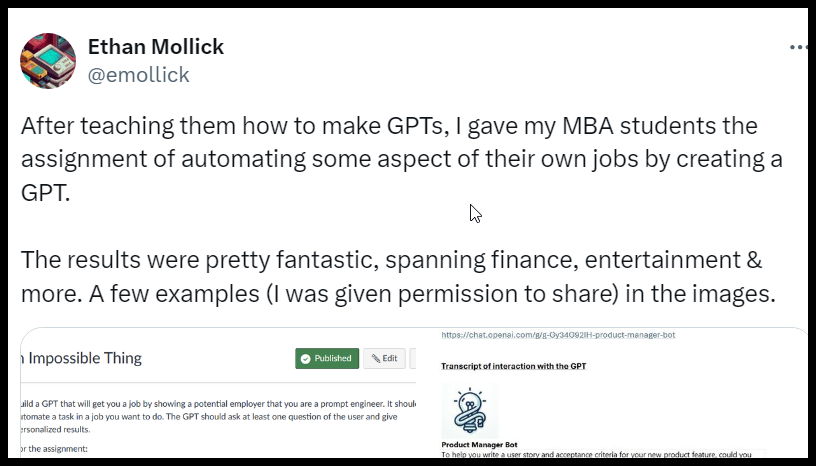
Documentation Mindset: They have started to see the importance of documenting processes and meetings it's not fully integrated this into their workflow, but dots are connecting.
Collaboration and Evangelism
AI Updates, basic knowledge: Folks here show interest in learning about different AI technologies but might not fully grasp the distinctions between versions like ChatGPT 3.5 vs. 4.0. While they are not the kind of person who is teaching everyone how these things work, they are using them. They are adding to their knowledge base.
Wil's Take
Staying in this stage means you are taking a risk, but it could pay off, kinda. If you stay here you are hoping governments, human nature or something slows the spread of AI, meaning you might be able to stay here for 18-24 months before these jobs are 50% gone.
%20(2)-png.png?width=1200&height=650&name=Cream%20and%20Black%203%20Tips%20Instagram%20Post%20(1200%20x%20650%20px)%20(2)-png.png)
Stage 3 - Integrated
This stage is where you move from "I read, I heard" statements to "I built", I "tested" statements.
Assessment of my work today
How much of my job is a checklist? It is likely that they are spending 50%-75% or more of their time on tasks that don't start with a checklist.
AI Tool Adoption & Usage
AI Tool Usage: Stage 3 marketers have turned automation into an art form. They've gone through stage 1 and stage 2, dissected their daily tasks, identified patterns, and crafted checklists that serve as the launchpad for their AI-powered workflows.
All those tools they learned about in stage 1 and 2, are now integrated into their work. They know when they are doing checklist work and they definitely have ideas on what tech would be needed to help free them up from doing it, giving them more time to work on strategy.
Mindset & Attitude Towards AI
Bridge Makers: In every organization, there are those people who seem to find a way. They seem like this scene in Apollo 13. When you say we have to get this square peg in this round hole, they are skeptical, but they know with the right support, it will be figured out because the future requires them to build solutions to help clients win.
"The people upstairs handed us this one, and we gotta come through."
Learning & Skill Development
They're the bridge between AI theory and practice, and their colleagues know it!
Stage 3 Marketers have been in the AI trenches enough to have encountered and solved the common challenges, but not so long that their solutions are inaccessible to the average marketer.
They get the value of a "digitize everything" mindset! Everything not recorded is "technical debt" in an AI sense and they get it.
Innovation and Application
It's a way of life - every client call, every document review, every process walkthrough – they try to capture it all, sure they forget once in a while.
They are the kind of person to bust out a phone in the middle of a chat and say, "can I record this, I want it for later."
They understand that data, especially unique data, is the fuel that powers AI and they see every conversation, solution, step by step process as ammo to stockpile for the day when AI can turn those vast data reserves into insights and process automations.
Collaboration and Evangelism
Stage 3 marketers are not getting "automated" out of their jobs, they are evangelists, eager to help their colleagues in sales, HR, and beyond "client work" leverage AI to work smarter. They can find ways to help people anywhere in the org think through AI use cases, making them valuable in multiple divisions.
If Sam Altman's prediction was even only 50% right and the AI revolution turned the job market upside down tomorrow, Stage 3 marketers would be easily be left standing, but we ain't waking up to be left standing, those of us in stage 3 are preparing for stage 4.
Wil's Take
Staying in this stage is still a risk, it is a bet, but it is a good bet. Your job may change a bit but leaders want you on their teams because your AI acumen is strong. In a Sam Altman world, you might be out of a job in 5-6 years in digital marketing but you learned the right skills to open up opportunities elsewhere, and your networking as a "can do" person is known by so many folks internally that as people move on, they'll vouch and bring you with them.
This is where your marketing career starts to have some safety.
%20(3)-png.png?width=1200&height=650&name=Cream%20and%20Black%203%20Tips%20Instagram%20Post%20(1200%20x%20650%20px)%20(3)-png.png)
Stage 4 - Re-imagined
This stage is where deep, broad testing and use of AI is the norm, and innovation leads to reimagined work processes.
Assessment of my work today
How much of my job is a checklist? Likely very little, only the things that are mission critical. You are an escalation source when the checklist breaks down and gladly help level up those in stage 1 and 2.
AI Tool Adoption & Usage
AI Tools: Stage 4 marketers think broader than tools, blog posts, and hot takes, they think in terms of problems, solutions, and scale, they are pioneers, at the forefront, they have torched hours climbing the mountaintop only to have things not work, but they see that not as failure but as part of pioneering.
They're not just collecting data for the sake of it – they're preparing for the day when AI can turn that data into game-changing insights and solutions. They are the kind of people that see this and say, I'm going to start a library of every step I take, so I can be ready to test this the minute Gemini 1.5 Pro becomes available (which you'll see why in a few paragraphs).
Mindset & Attitude Towards AI
Curiosity turned into currency: Stage 4 marketers are looking for ways to circumvent organizational barriers to AI adoption, client says we can't use ChatGPT, they get someone to install a local LLM, they're not taking no for an answer; they're finding creative solutions. Getting around corporate barriers and getting things done has always improved people's value even before AI.
Learning & Skill Development
Depth of knowledge: They have an intimate understanding of the current AI landscape, including its limitations and untapped potential, but are humble enough to know there's a lot of solutions out there they don't know or understand. They have grown AI networks of people outside your organization who help them see the world through a broader leans.
These pioneers are comfortable pushing AI to its limits in their own work, automating processes and building custom solutions. But they also know when it's time to call in the developers.
Stage 4 marketers are consistently dabbling with code, but they are NOT coders.
They recognize that AI can help them write the code, to execute python scripts to access APIs, giving them more unique data and more ways to solve unique problems in ways that in the past would have required developer time.
Also, they are in position to see what people "above their skill sets" are doing and they are ready to follow as the technology becomes democratized.
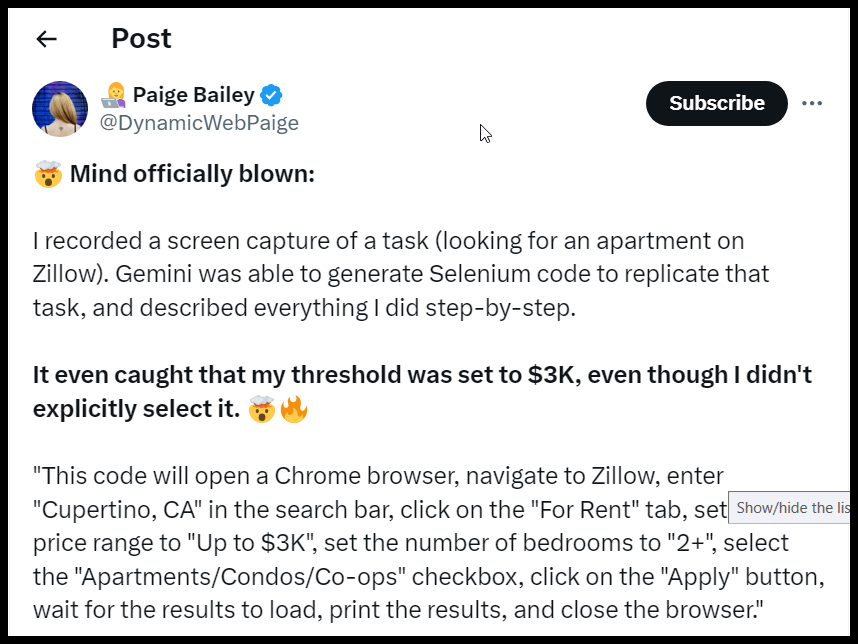
Innovation and Application
Stage 4 marketers track LLM improvements over time, they take the same query over and over and test on their own how much better or worse models are getting.
They know that what's impossible for AI today might be simple tomorrow, and they want to be the first to know when that switch flips. This continuous testing allows them to identify the exact moment when an AI solution becomes viable for real-world deployment.
The 80/20 Innovator: Stage 4 marketers have done the work to identify the tasks that consume 80% of their time but deliver only 20% of the value – and they've built mini AI solutions to automate them, maybe half of them don't work, but they've attempted to build them and learn along the way. You could pass this person in the hall at work, and they could rattle off 3-4 solutions that if they could scale them they would, but they have built.
I can do more with less, at a 75% quality level: Perhaps the most impressive trait of Stage 4 marketers is their ability to do more with less. If you wanna know if you have a stage 4 marketer in your midst, role play a scenario where you give them the same book of business as a leader, but only half the team to manage that book, and watch them go to work.
In SEO this might be how they would use the tools and knowledge to do keyword research, outreach, internal linking, etc in a high value way, in a find a way to maintain the same level of quality and output.
In SEM, imagine someone who scraped competitor ads and ran an analysis on those ads to see where are we bidding where all the ads are "missing the mark" and that creates an opportunity for us (my first prototype of this was built almost a year ago).
They're not just using AI to work faster – they're using it to fundamentally reimagine how work gets done.
Collaboration and Evangelism
Like their stage 3 counterparts, they can also explain complex AI concepts to laypeople, filtering out the noise to focus on what creates real value, they are a lot less likely to get into the hype of AI and have to be reined in, they don't lose focus that goals come before tools.
Wil's Take
Honestly this is mostly where I am. I think in this world you are likely safe in the last 10- 15% of marketers left. You have shown a ton of value and an ability to pivot and think creatively. You are safe and have a job as long as you need one.
%20(4)-png.png?width=1200&height=650&name=Cream%20and%20Black%203%20Tips%20Instagram%20Post%20(1200%20x%20650%20px)%20(4)-png.png)
Stage 5 - Re-invented
There's a characteristic of people in this stage, they have always tried to actively put themselves out of a job, well before AI, AI is just a new, more efficient tool to be deployed to let them do what they always envisioned.
AI Tool Adoption & Usage
OG's that don't feel threatened: Stage 5 marketers were like this well before AI. They were doing app scripts, excel sheets, macros, VBA scripts and other automations well before AI existed. It is in the blood. They fundamentally believe that if they can automate any task, that they'll find other more valuable work in their organizations. When they see that only 5-10% of the work is going to be left, they are not scared, dare I say like Bone Crusher, they were never scared.
Mindset & Attitude Towards AI
How a company looks at these people: The company may see people like this as the kind of people they wish they had 2 of or 3 of because if they could only clone them, they know and have a track record of the value generated. With AI companies may start to pair developers with these people to speed up & validate what's in their heads that they can't do on their own due to knowledge or time constraints. It's never about replacing the Stage 5 marketer – it's about amplifying their impact.
Learning & Skill Development
The developer's (humble) ally: While stage 5 marketers may not be developers themselves, they can be a developer's best ally. They can bring a semi-built solution to the table, which highlights a work flow and an approach. Now they also need to be humble enough to know where a developer might come at the same problem with a totally different approach. The Stage 5 marketer knows that the collaboration will ultimately lead to a stronger, more scalable solution. They're not focused on whose solution gets to market they're focused on the end result.
Innovation and Application
Solving scaling pains: As Stage 4 marketers build more and more sophisticated AI solutions, they may start to run into scaling challenges. Their homebrew AI tools may work well on a small scale, but they may struggle to handle enterprise-level data volumes and user loads, stage 5 marketers can think through those implications, and possibly build a better solution with a dev.
When the hype cycle dies, they're growing: they're changing how business is done. And that's a legacy that will endure long after the AI hype cycle has run its course.
Collaboration and Evangelism
Success is in who you bring with you: In this stage your leaders are the ones who are advocating for the widespread adoption, knowing that the more people who use them, the more value they'll create for the organization. These folks wil face headwinds, and while they are individually smart they will also recognize that change management is hard and will find a way to find "their people" in the org and get what they built into the hands of team members to level others up.
Wil's Take
You are Tom Hanks in Saving Private Ryan, you kept all the people on your team alive that you could, you got them through the hard times but their careers are ever changed because you reached back to bring others with you.
There are people in stage 2,3,4 because you did the hard work, not just for yourself, but for others. That skill, determination, and leadership will be needed everywhere.
A CEO's Parting Notes
As I wrote this I did the math, lets say there are 500,000 digital marketers (made up number), and I have a company of 200 people. If only 15% of our jobs are left, that is 75,000 jobs from 500,000. In order for me to sleep easy, I need to know that I gave everyone in my company the chance to level up and be in that last 15%. Out of 75,000 jobs left, I wouldn't mind taking a small slice of those, we only need space for about 200 :)

%20(1)-png.png?width=1200&height=650&name=Cream%20and%20Black%203%20Tips%20Instagram%20Post%20(1200%20x%20650%20px)%20(1)-png.png)
